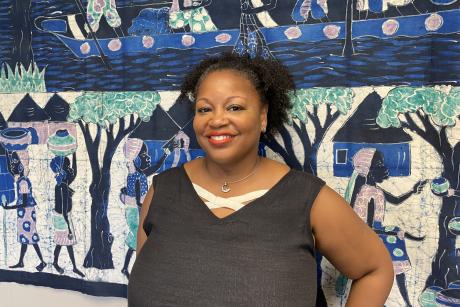When it became clear that Haitian recovery efforts following the January earthquake would not take years but decades, a number of Duke departments and institutes pooled its resources to create one of the first humanities labs at US universities to bring innovative, interdisciplinary research more fully into the undergraduate experience, with the intention of positively impacting the Haitian community.
“How do we as an institution work in a country that has experienced such a catastrophe and help with the rebuilding process? We are exploring that question with the Haiti Lab,” said Kathy Walmer, a core faculty member of the new initiative and adjunct assistant professor of Global Health at DGHI.
Developed by the John Hope Franklin Humanities Institute and housed at its offices in Smith Warehouse, the Haiti Lab is a three-year initiative that will pursue a diverse set of research and teaching opportunities that range from Haitian history, society and culture, to health, law and technology. It is the latest example of collaboration across Duke’s schools, departments and seven signature institutes. The initiative is co-directed by Deborah Jenson, French and Romance Studies; and Laurent Dubois, History and Romance Studies. Core faculty members include Kathy Walmer, global health; and Guy-Uriel Charles, law. See complete listing of 2010-11 lab-affiliated faculty.
“Through the Haiti Lab, we want to integrate more collaborative and innovative structures into humanities at the undergraduate and graduate levels, with more vertical integration of research and projects at Duke,” said Jenson. “We’re hoping to prepare students and assist researchers in making substantive and culturally- sensitive contributions to the recovery process, making a difference for the people of Haiti.”
The humanities lab will address the challenges of rebuilding women’s rights and the incidence of mental health issues in the aftermath of the earthquake, the translation and publishing of correspondence between the first two former slave leaders of the Haitian revolution, a collaborative art project with a renowned Haitian artist, and a virtual seminar and conference between faculty at Duke and the Universite D’Etat d’Haiti. The Haiti Lab began in spring 2010 with the rapid development of “Creole for the Haitian Recovery,” which has become a popular course for students who seek to gain basic language and cultural skills before working in Haiti.
“I can attest that the course is an amazing presentation of the culture and core language of Haiti that many people do not get to learn about, even for those like myself who are of the Haitian Diaspora,” said junior Sedlin Mirtil, a biological anthropology and anatomy major pursuing the global health certificate who plans to return to his country to assist with rebuilding efforts. “I’ve seen and experienced the hardships that beset the country. I intend to spend a large part of my life in Haiti, doing work related to improving the country’s public health infrastructure.”
This fall, Mirtil is one of 11 students enrolled in the new global health independent study, co-directed by Jenson and Walmer, who heads the nonprofit Family Health Ministries (FHM) with her husband David Walmer. The independent study addresses topics related to the work of FHM in rural Haiti, including cervical cancer prevention, maternal mortality, GPS mapping of post-earthquake health facilities, and a new Post-traumatic Stress Disorder (PTSD) incidence and cultural presentation study.
“Nine months later, there are still lots of people living in tent cities who don’t have clean water, food and health care – which adds to PTSD. But there is a lot of stigma associated with mental health issues,” said Walmer, who will work on the PTSD project with Jenson and Duke Vice President for Institutional Equity Benjamin Reese, also a clinical psychologist. “So we will go in, working to design something that is more culturally appropriate and see how best to help people who have been impacted by the earthquake.”
Students enrolled in the independent study will travel to Haiti during fall break to interview earthquake victims on the incidence and manifestations of PTSD, and their beliefs about shock, grief, distress and trauma.
“Understanding the individual and societal trauma created from the earthquake will be a long and complex undertaking, and I would like to do as much as I can to help in that process,” said senior Kendra Hinton, a French and psychology double major who is studying Creole, and appreciates the multi-disciplinary focus of the Haiti Lab and the independent study. “In a time of crisis, we need to acknowledge that no single discipline has all the answers. Duke stresses the importance of interdisciplinary cooperation through its many programs, and I think that such an initiative continues in that vein.”
“It’s a blessing to be involved with DGHI and be in an academic setting in which Duke can provide both manpower and support to develop innovative programs that benefit the students, and ultimately impact the Haitians,” said Walmer. “With all disciplines working together, we are inspiring innovation, and are getting it right the first time.”
This spring, Walmer will teach a new course focusing on global health issues in Haiti, “Global Health and International Development in the Nonprofit Sector” (GLHLTH166). David Walmer also teaches a related course in the spring semester entitled “Issues of Healing and Caring for Underserved Populations: A global perspective with an emphasis on Haiti” (GLHLTH211).
Learn more about the Haiti Lab, and see the many opportunities to get involved, including a plethora of courses, independent studies, working groups, research assistantships and internships.



